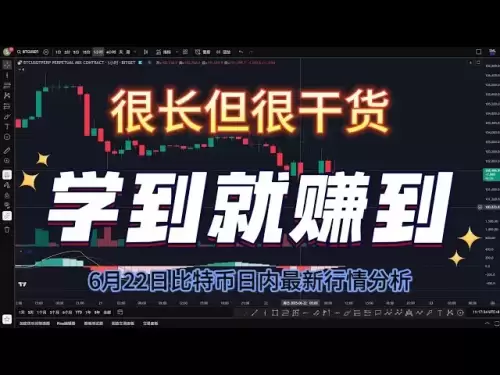-
 Bitcoin
Bitcoin $102,881.1623
-0.60% -
 Ethereum
Ethereum $2,292.8040
-5.48% -
 Tether USDt
Tether USDt $1.0004
0.02% -
 XRP
XRP $2.0869
-2.02% -
 BNB
BNB $634.6039
-1.35% -
 Solana
Solana $136.1527
-3.00% -
 USDC
USDC $1.0000
0.01% -
 TRON
TRON $0.2728
-0.45% -
 Dogecoin
Dogecoin $0.1572
-3.70% -
 Cardano
Cardano $0.5567
-5.07% -
 Hyperliquid
Hyperliquid $34.3100
-1.20% -
 Bitcoin Cash
Bitcoin Cash $462.5691
-2.33% -
 Sui
Sui $2.5907
-5.21% -
 UNUS SED LEO
UNUS SED LEO $8.9752
1.13% -
 Chainlink
Chainlink $12.0549
-4.93% -
 Stellar
Stellar $0.2381
-2.36% -
 Avalanche
Avalanche $16.9613
-3.47% -
 Toncoin
Toncoin $2.8682
-2.36% -
 Shiba Inu
Shiba Inu $0.0...01095
-3.70% -
 Litecoin
Litecoin $81.8871
-2.43% -
 Hedera
Hedera $0.1377
-5.36% -
 Monero
Monero $310.8640
-0.68% -
 Ethena USDe
Ethena USDe $1.0007
0.03% -
 Dai
Dai $1.0001
0.03% -
 Polkadot
Polkadot $3.3103
-5.19% -
 Bitget Token
Bitget Token $4.2168
-1.95% -
 Uniswap
Uniswap $6.4643
-8.14% -
 Pepe
Pepe $0.0...09329
-7.42% -
 Pi
Pi $0.5111
-5.23% -
 Aave
Aave $235.2340
-5.77%
What if the Dogecoin wallet transfer fails? How to solve common errors?
If your Dogecoin transfer fails, check for insufficient funds, incorrect addresses, network congestion, or wallet issues; adjust fees or retry to resolve.
May 10, 2025 at 01:22 pm
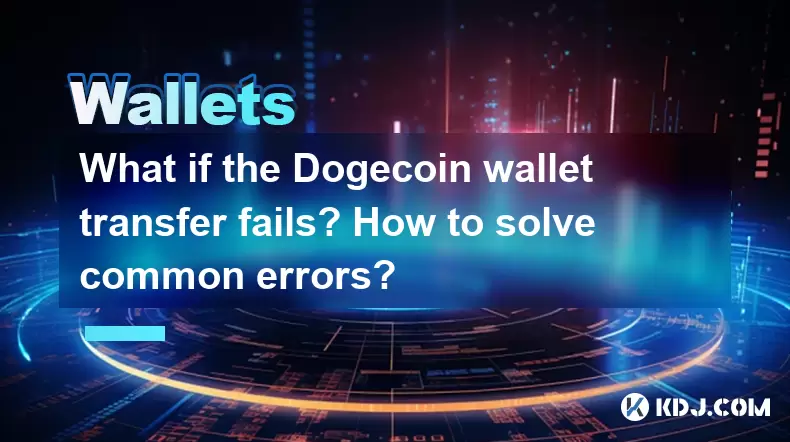
What if the Dogecoin wallet transfer fails? How to solve common errors?
Transferring Dogecoin from one wallet to another can occasionally result in errors that prevent the transaction from completing successfully. Understanding the common issues and how to solve them is crucial for any Dogecoin user. This article will guide you through the troubleshooting process for the most frequent problems encountered during Dogecoin transfers.
Common Reasons for Dogecoin Transfer Failures
There are several reasons why a Dogecoin transfer might fail. Some of the most common include:
- Insufficient funds: If the sender's wallet does not have enough Dogecoin to cover the transaction amount and the transaction fee, the transfer will fail.
- Incorrect recipient address: Entering an incorrect or invalid Dogecoin address will cause the transaction to fail.
- Network congestion: During times of high network activity, transactions can be delayed or fail due to congestion on the Dogecoin blockchain.
- Transaction fee issues: If the transaction fee is set too low, the transaction might not be processed by miners, leading to a failure.
- Wallet software issues: Bugs or technical problems within the wallet software can also cause transfer failures.
Troubleshooting Insufficient Funds
If your Dogecoin transfer fails due to insufficient funds, follow these steps to resolve the issue:
- Check your balance: Ensure that your wallet has enough Dogecoin to cover both the transfer amount and the transaction fee. You can usually find your balance on the main screen of your wallet application.
- Adjust the transaction amount: If you don't have enough funds, reduce the amount you're trying to send or add more Dogecoin to your wallet.
- Verify the transaction fee: Some wallets allow you to adjust the transaction fee. If the fee is too high, it might be consuming a significant portion of your available balance.
Fixing Incorrect Recipient Addresses
Entering an incorrect recipient address is a common mistake that can lead to transfer failures. Here's how to address this issue:
- Double-check the address: Before confirming the transaction, always double-check the recipient's Dogecoin address. A single incorrect character can cause the transaction to fail.
- Use the copy-paste function: To avoid manual entry errors, use the copy-paste function to transfer the address from the recipient's wallet or a trusted source.
- Validate the address: Some wallet applications allow you to validate the address format before sending. Use this feature if available to ensure the address is correct.
Handling Network Congestion
Network congestion can delay or prevent Dogecoin transactions from being processed. Here's how to handle this issue:
- Wait and retry: Sometimes, waiting a few hours and retrying the transaction can resolve the issue as network congestion decreases.
- Increase the transaction fee: Setting a higher transaction fee can incentivize miners to process your transaction more quickly, even during times of high network activity.
- Use a different wallet: Some wallets are better optimized for handling network congestion. If you're experiencing persistent issues, consider using a different wallet application.
Adjusting Transaction Fees
Transaction fees play a crucial role in the successful processing of Dogecoin transfers. Here's how to address issues related to transaction fees:
- Check the current fee rate: Use a Dogecoin fee estimator tool to check the current recommended transaction fee. Setting your fee too low can result in delays or failures.
- Adjust the fee in your wallet: Many wallet applications allow you to manually adjust the transaction fee. Increase the fee if your transaction is not being processed.
- Use a wallet with dynamic fee settings: Some wallets automatically adjust the transaction fee based on network conditions, which can help ensure your transactions are processed more reliably.
Resolving Wallet Software Issues
Sometimes, the issue might be with the wallet software itself. Here's how to troubleshoot and resolve wallet-related problems:
- Update the wallet software: Ensure that you're using the latest version of your wallet application. Developers often release updates to fix bugs and improve performance.
- Reinstall the wallet: If updating doesn't resolve the issue, try uninstalling and reinstalling the wallet application. This can fix corrupted files or other software issues.
- Use a different wallet: If you continue to experience issues with your current wallet, consider switching to a different wallet application that might be more reliable.
Additional Tips for Successful Dogecoin Transfers
To minimize the risk of transfer failures, consider the following tips:
- Always double-check the recipient's address before sending.
- Keep your wallet software up to date to benefit from the latest improvements and bug fixes.
- Monitor the Dogecoin network's current status and adjust your transaction fees accordingly.
- Maintain a small buffer of Dogecoin in your wallet to cover unexpected transaction fees.
Frequently Asked Questions
Q: Can I recover a failed Dogecoin transaction?
A: If a transaction fails due to insufficient funds or an incorrect address, it cannot be recovered. However, if the transaction is stuck due to network congestion or a low fee, you might be able to speed it up by increasing the fee through a process called "transaction acceleration" if your wallet supports it.
Q: How long should I wait before considering a Dogecoin transaction failed?
A: Dogecoin transactions typically take a few minutes to an hour to confirm. If your transaction has not been confirmed after several hours, it may be considered failed. However, waiting up to 24 hours is recommended before taking further action.
Q: Can I cancel a Dogecoin transaction after it has been sent?
A: Once a Dogecoin transaction is broadcast to the network, it cannot be canceled. If you've sent it to the wrong address or with an insufficient fee, you'll need to wait for it to either fail or be processed.
Q: What should I do if my Dogecoin wallet is not syncing?
A: If your wallet is not syncing, try restarting the application, checking your internet connection, and ensuring your wallet software is up to date. If the issue persists, consider reinstalling the wallet or seeking support from the wallet's developers.
Disclaimer:info@kdj.com
The information provided is not trading advice. kdj.com does not assume any responsibility for any investments made based on the information provided in this article. Cryptocurrencies are highly volatile and it is highly recommended that you invest with caution after thorough research!
If you believe that the content used on this website infringes your copyright, please contact us immediately (info@kdj.com) and we will delete it promptly.
- Trump Family's Crypto Empire: From Skeptic to Kingpin?
- 2025-06-23 00:25:12
- BlockDAG, Cardano, and Polygon: Decoding the Crypto Buzz in the Big Apple
- 2025-06-23 00:45:12
- Avalanche, Filecoin, and Web3 Storage: A New Era for Decentralized Applications
- 2025-06-23 00:25:12
- Erin Redwing & WBD922: Decoding Crypto's Cosmos and the Dogwifhat Craze
- 2025-06-23 00:45:12
- Dogecoin, Pepe, and DeFi: A New York Minute on Crypto's Wild Ride
- 2025-06-23 00:50:12
- XLM Price Prediction, June 22: Will Stellar Break Out?
- 2025-06-23 01:05:12
Related knowledge
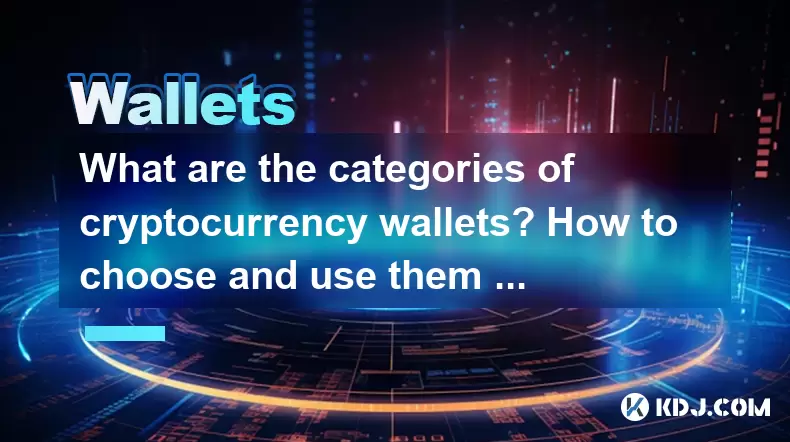
What are the categories of cryptocurrency wallets? How to choose and use them safely?
Jun 21,2025 at 10:42pm
Understanding Cryptocurrency WalletsCryptocurrency wallets are essential tools for anyone involved in the digital asset ecosystem. They allow users to store, send, and receive cryptocurrencies securely. Unlike traditional wallets that hold physical money, crypto wallets manage cryptographic keys—private and public—which interact with blockchain networks...
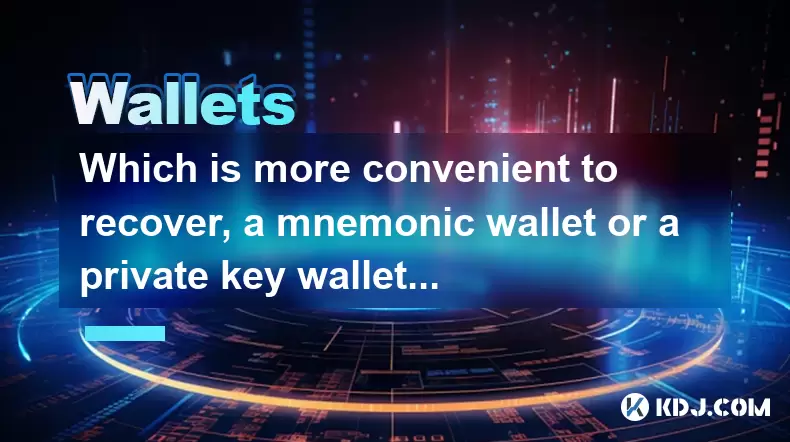
Which is more convenient to recover, a mnemonic wallet or a private key wallet? Will security be compromised?
Jun 20,2025 at 06:36am
Understanding Mnemonic Wallets and Private Key WalletsIn the world of cryptocurrency, wallet recovery is a crucial aspect that users must understand before storing digital assets. Two popular methods for securing and recovering wallets are mnemonic phrases and private keys. Both serve as gateways to access funds, but they differ significantly in terms o...
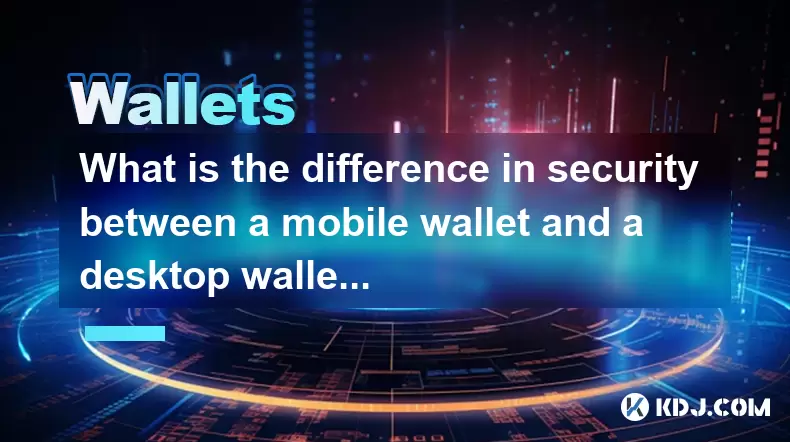
What is the difference in security between a mobile wallet and a desktop wallet?
Jun 22,2025 at 12:35pm
Understanding the Security Aspects of Mobile WalletsMobile wallets are digital wallets designed to run on smartphones, allowing users to store, send, and receive cryptocurrencies conveniently. The security of mobile wallets largely depends on how well the device is protected from malware, phishing attacks, and unauthorized access. One key feature of mob...
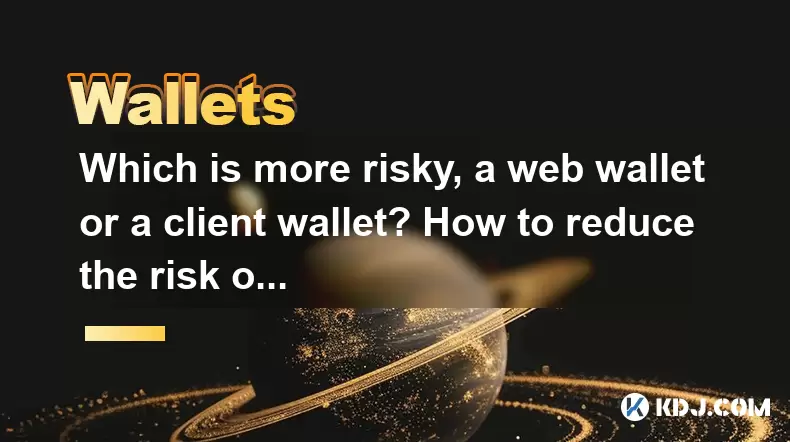
Which is more risky, a web wallet or a client wallet? How to reduce the risk of use?
Jun 22,2025 at 09:21pm
Understanding Web Wallets and Client WalletsWhen managing cryptocurrencies, choosing the right type of wallet is crucial. Web wallets and client wallets are two popular options among users, each with its own set of advantages and disadvantages. A web wallet operates through a browser interface and is usually hosted online by third-party services. This m...
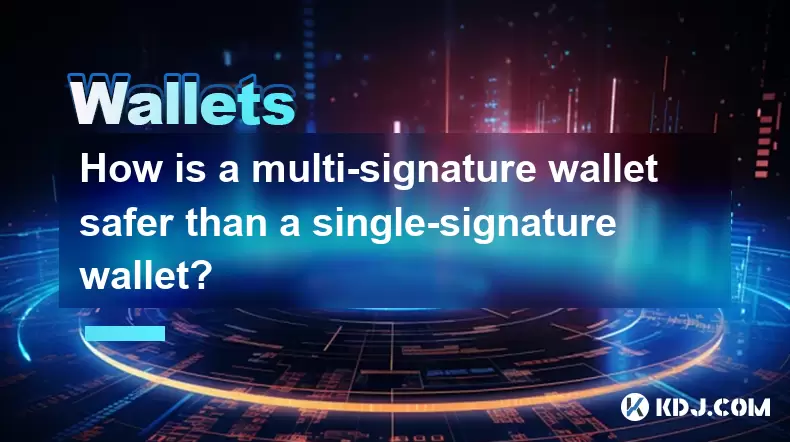
How is a multi-signature wallet safer than a single-signature wallet?
Jun 21,2025 at 07:56pm
Understanding Signature Mechanisms in Cryptocurrency WalletsIn the world of cryptocurrency, securing digital assets is paramount. One of the core aspects of this security lies in the signature mechanism used by wallets. A single-signature wallet requires only one private key to authorize a transaction. This means that if an attacker gains access to that...
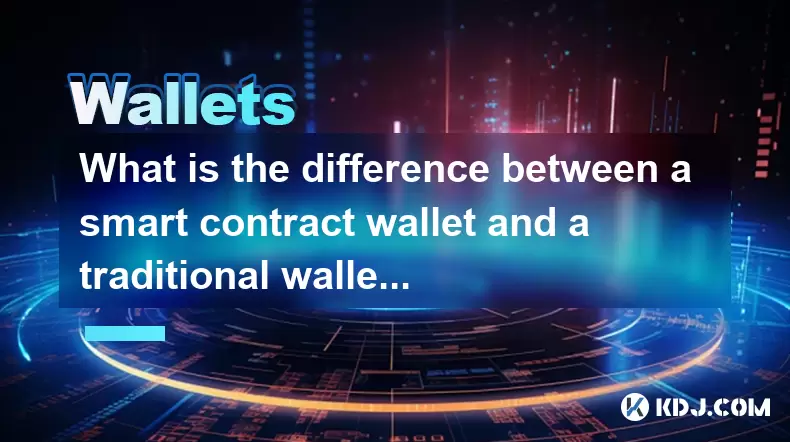
What is the difference between a smart contract wallet and a traditional wallet? In which scenarios must it be used?
Jun 21,2025 at 10:28am
Understanding Smart Contract Wallets and Traditional WalletsIn the cryptocurrency ecosystem, wallets are essential tools for managing digital assets. However, not all wallets operate in the same way. Two primary types of crypto wallets exist: smart contract wallets and traditional wallets. Each has distinct characteristics that make them suitable for sp...

What are the categories of cryptocurrency wallets? How to choose and use them safely?
Jun 21,2025 at 10:42pm
Understanding Cryptocurrency WalletsCryptocurrency wallets are essential tools for anyone involved in the digital asset ecosystem. They allow users to store, send, and receive cryptocurrencies securely. Unlike traditional wallets that hold physical money, crypto wallets manage cryptographic keys—private and public—which interact with blockchain networks...

Which is more convenient to recover, a mnemonic wallet or a private key wallet? Will security be compromised?
Jun 20,2025 at 06:36am
Understanding Mnemonic Wallets and Private Key WalletsIn the world of cryptocurrency, wallet recovery is a crucial aspect that users must understand before storing digital assets. Two popular methods for securing and recovering wallets are mnemonic phrases and private keys. Both serve as gateways to access funds, but they differ significantly in terms o...

What is the difference in security between a mobile wallet and a desktop wallet?
Jun 22,2025 at 12:35pm
Understanding the Security Aspects of Mobile WalletsMobile wallets are digital wallets designed to run on smartphones, allowing users to store, send, and receive cryptocurrencies conveniently. The security of mobile wallets largely depends on how well the device is protected from malware, phishing attacks, and unauthorized access. One key feature of mob...

Which is more risky, a web wallet or a client wallet? How to reduce the risk of use?
Jun 22,2025 at 09:21pm
Understanding Web Wallets and Client WalletsWhen managing cryptocurrencies, choosing the right type of wallet is crucial. Web wallets and client wallets are two popular options among users, each with its own set of advantages and disadvantages. A web wallet operates through a browser interface and is usually hosted online by third-party services. This m...

How is a multi-signature wallet safer than a single-signature wallet?
Jun 21,2025 at 07:56pm
Understanding Signature Mechanisms in Cryptocurrency WalletsIn the world of cryptocurrency, securing digital assets is paramount. One of the core aspects of this security lies in the signature mechanism used by wallets. A single-signature wallet requires only one private key to authorize a transaction. This means that if an attacker gains access to that...

What is the difference between a smart contract wallet and a traditional wallet? In which scenarios must it be used?
Jun 21,2025 at 10:28am
Understanding Smart Contract Wallets and Traditional WalletsIn the cryptocurrency ecosystem, wallets are essential tools for managing digital assets. However, not all wallets operate in the same way. Two primary types of crypto wallets exist: smart contract wallets and traditional wallets. Each has distinct characteristics that make them suitable for sp...
See all articles
























